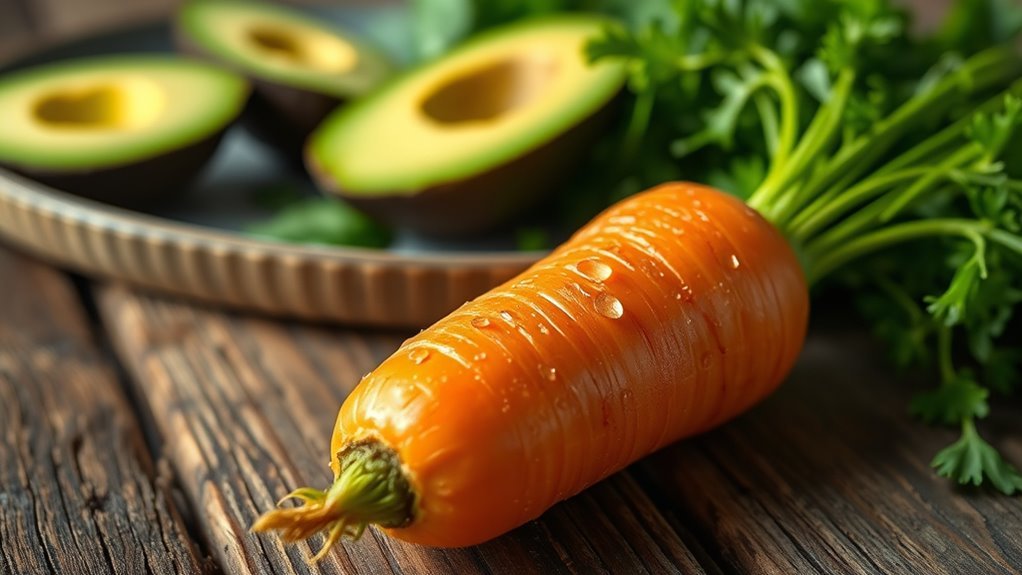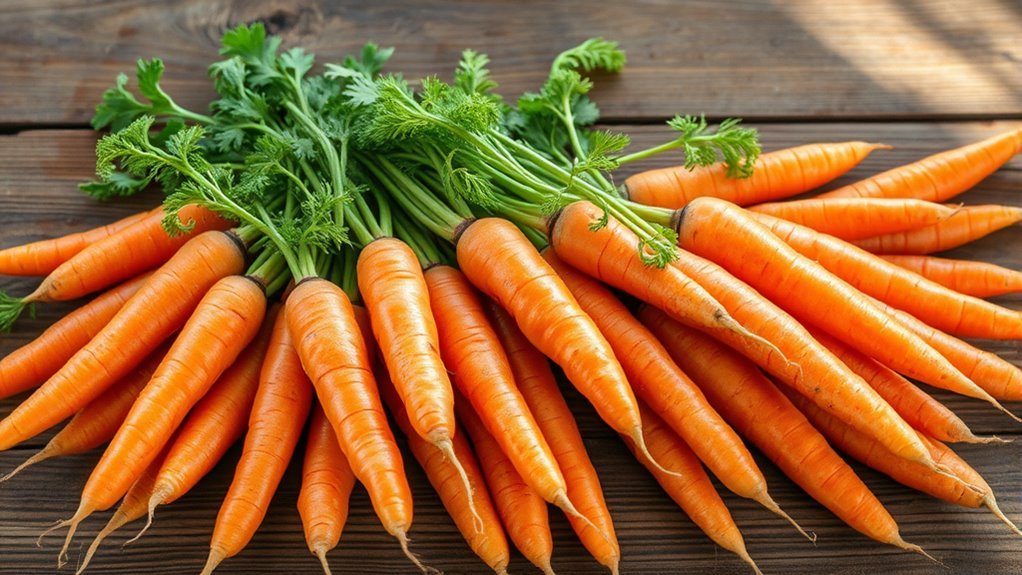Yes, you can have carrots on a keto diet, but moderation is essential. Carrots contain about 9 grams of carbohydrates per 100 grams, which can impact your daily carb limit. They offer beneficial nutrients, including fiber and antioxidants, making them a healthy choice in small amounts. Pair them with low-carb foods to balance your meals. Want to explore more ways to enjoy carrots without derailing your keto goals? There are plenty of tips and alternatives to contemplate!
Understanding Carbohydrates in Carrots

While you might think of carrots as a healthy snack, understanding their carbohydrate content is vital if you’re following a keto diet. Carrots contain about 9 grams of carbohydrates per 100 grams, which can impact your daily carb limit. It’s important to take into account their glycemic index (GI) as well; carrots have a moderate GI, which means they can raise blood sugar levels more than low-GI foods. This is significant for keto dieters aiming to maintain ketosis. However, you don’t have to eliminate carrots entirely. Instead, you can enjoy them in moderation, balancing your carb intake with other low-carb foods. By being mindful of portion sizes, you can still appreciate carrots without jeopardizing your keto goals.
Nutritional Profile of Carrots

Carrots pack a variety of essential nutrients that can complement a balanced diet, even for those on a keto plan. Different carrot varieties, like the classic orange, purple, and rainbow types, offer unique flavors and nutrients. A medium carrot contains about 25 calories and provides a good source of fiber, vitamin A, and antioxidants, which are crucial for maintaining eye health and boosting your immune system. The health benefits of carrots extend beyond just vitamins; they can help improve digestion and promote healthy skin. While you may need to watch your carb intake on keto, incorporating small amounts of carrots can still contribute to your overall nutrient intake without compromising your dietary goals. Enjoy their crunch while reaping their rewards!
Comparing Carrots to Other Vegetables

When comparing carrots to other vegetables, it’s important to evaluate their carbohydrate content, especially for those following a keto diet. While carrots are nutritious, they do contain more carbs than some vegetable alternatives. This can impact your carb count for the day.
Here’s a quick comparison of carrots and other popular vegetables:
| Vegetable | Net Carbs (per 100g) |
|---|---|
| Carrots (varieties) | 7.0g |
| Zucchini | 3.1g |
| Spinach | 1.4g |
While you might enjoy different carrot varieties, be mindful of their carb content compared to lower-carb options like zucchini or spinach. Balancing your choices can help you stay aligned with your keto goals.
How to Incorporate Carrots Into a Keto Diet
Incorporating carrots into a keto diet can be done thoughtfully, allowing you to enjoy their flavor and nutrition without exceeding your carbohydrate limits. Start by making carrot recipes that focus on smaller portions, like roasted carrots with herbs, which can enhance their natural sweetness while keeping carbs in check. You can also create keto snacks using baby carrots dipped in high-fat dressings or guacamole, providing a satisfying crunch. Pairing carrots with other low-carb vegetables can help balance your meals and keep your carb count low. Remember, moderation is key; enjoy carrots as an occasional treat rather than a staple. This way, you can savor their taste and nutrients while maintaining your keto lifestyle.
Tips for Enjoying Carrots While Staying Keto-friendly
While it’s tempting to indulge in the vibrant crunch of carrots, keeping your keto goals in mind is essential for maintaining a balanced diet. Consider enjoying carrots in moderation, perhaps as a crunchy addition to salads or paired with high-fat dips like guacamole or cream cheese. To stay within your carb limits, think about incorporating carrot alternatives, such as celery sticks or radishes, which are lower in carbohydrates. Additionally, explore low carb snacks like cucumber slices or bell pepper strips to satisfy your cravings without jeopardizing your keto journey. Remember, it’s all about balance and finding what works for you, allowing you the freedom to enjoy flavors while adhering to your dietary preferences.


